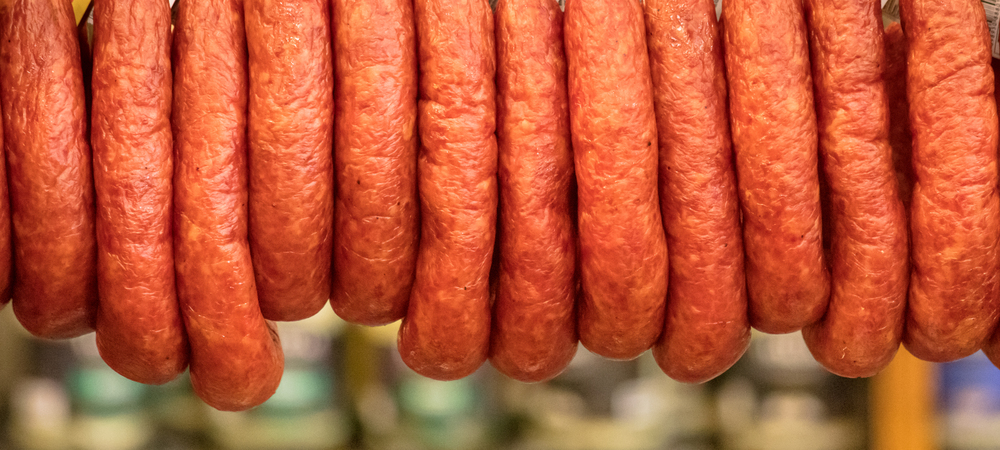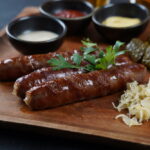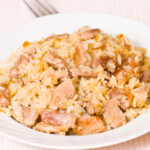Kielbasa: More Than Just a Sausage
When you hear the word “kielbasa,” what comes to mind? A smoky, savory sausage, perhaps? You’re right, but kielbasa is so much more than just a simple sausage. In Polish, “kiełbasa” is the generic word for “sausage,” encompassing a wide range of varieties, each with its own unique history, flavor, and cultural significance. From the classic smoked kielbasa to the fresh, uncooked varieties, kielbasa is a culinary icon, a versatile ingredient that can be enjoyed in countless ways.
Kielbasa is a true embodiment of Polish heritage, woven into the fabric of their culinary traditions. Imagine a family gathering around a table laden with a steaming platter of kielbasa, sharing stories and laughter. It’s a symbol of warmth, tradition, and togetherness. Whether it’s a special celebration or a simple family dinner, kielbasa is always a welcome sight. The distinct flavors and textures of kielbasa are a direct result of generations of Polish cooks, who have meticulously honed their recipes and techniques. It’s a testament to their dedication to preserving and sharing their culinary legacy.
Tracing the Roots: Unveiling the History
So, where does this beloved sausage hail from? The answer, like many things in food history, is a bit complex. The word “kiełbasa” itself shares a fascinating connection with the Russian word “kolbasa,” both meaning sausage. This suggests a shared history of sausage-making in both Poland and Russia, but pinpointing the exact origin is challenging.
Think of it this way: imagine two neighbors, each independently creating their own unique recipes using similar ingredients. Both dishes evolve over time, with distinct regional variations emerging. Determining who started it first is tricky, as both have their own long histories and cultural influences.
However, there’s a common thread: both Poland and Russia have a long history of sausage-making, rooted in their respective cultures and traditions. It’s a testament to the ingenuity and resourcefulness of these peoples, who found clever ways to utilize readily available ingredients like meat and spices, preserving them for later use. Sausage-making was an essential skill for survival and celebration, a culinary tradition passed down through generations.
Varieties of Kielbasa: A World of Flavor
One of the most captivating aspects of kielbasa is its diversity. Within Poland alone, there are over 100 varieties, each with its own distinct character. This abundance of flavor is a testament to the regional variations and traditional recipes that have been passed down through generations. One of the most common types is traditional farmhouse sausage, made with simple ingredients and hearty flavors.
Traditional Farmhouse Sausage: A Taste of Polish Tradition
Imagine a comforting aroma of smoked pork, garlic, and spices wafting through the air. This is the essence of traditional farmhouse kielbasa, where the focus is on simple, wholesome ingredients and time-honored methods. Made primarily with pork, sometimes including wild game or veal, this kielbasa is seasoned with a blend of garlic, marjoram, salt, and pepper. It’s a testament to the ingenuity of Polish cooks who used readily available ingredients to create flavorful and satisfying dishes. The result is a sausage that’s both delicious and deeply satisfying.
While traditional farmhouse kielbasa is a beloved classic, modern times have brought new innovations and variations to the kielbasa scene. Immigration and cultural exchange have played a significant role in shaping kielbasa’s evolution, resulting in a wide variety of flavors and preparations available today. You can find kielbasa made with beef, turkey, and other ingredients, catering to diverse tastes and preferences.
Kielbasa in the United States: A Cultural Bridge
Kielbasa’s journey across the Atlantic began with German immigrants who brought their culinary traditions to the United States in the 1860s. These immigrants, seeking new lives and opportunities, carried with them their love for sausage, bringing it to the streets of New York City. Kielbasa quickly became a beloved comfort food, representing a taste of home and a connection to their heritage.
Over time, kielbasa found a place in the hearts and stomachs of Americans, becoming a staple in kitchens across the country. Its popularity stemmed from its versatility, its ability to be enjoyed in countless ways, and its ability to bring people together. The simple act of sharing a plate of kielbasa became a way for families and communities to connect, celebrating their shared experiences and embracing their cultural diversity.
American culture has also influenced kielbasa in unique ways, leading to new flavors and preparations. Dishes like kielbasa and sauerkraut, kielbasa sandwiches, and various other creative culinary combinations have emerged, showcasing the power of fusion cuisine. Kielbasa has seamlessly blended into the tapestry of American cuisine, becoming a testament to the harmonious exchange of cultures and traditions.
Polka Deli: Your Gateway to Authentic Kielbasa
Here at Polka Deli, we’re passionate about sharing the true essence of Polish cuisine. We believe that food is more than just sustenance; it’s a window into a culture’s soul, a bridge between generations. We’re committed to offering authentic Polish flavors, using traditional ingredients and recipes to create dishes that are both delicious and deeply satisfying.
Our kielbasa selection is a testament to this commitment. We offer a wide variety of kielbasa and sausage products from Polish and Eastern European cuisine, crafted with the utmost care and attention to detail. From traditional Polish kielbasa in different styles (homemade, BBQ, pork, dry, etc.) to specialty sausages like krakowska, Black Forest, and hunter style, our selection is designed to delight even the most discerning palate.
We also carry a diverse array of hot dogs, including veal knockwurst and chicken hot dogs, as well as unique items like kishka and liverwurst. For those seeking international flavors, we offer Hungarian salami and German cervelat. And for those who appreciate the taste of Polish tradition, we feature popular brands like Morliny and Sokolow. Whether you’re looking for a small family pack or a larger quantity, we offer a range of options to meet your needs.
We encourage you to explore our kielbasa selection and discover a world of flavor. We’re confident you’ll find something that tantalizes your taste buds and brings a taste of Polish heritage to your table. Stop by Polka Deli and let us share our passion for authentic Polish cuisine with you.
Conclusion
The origins of kielbasa remain a fascinating mystery, a story woven into the tapestry of Polish and Eastern European culture. While pinpointing the exact starting point may be difficult, the enduring popularity of kielbasa speaks volumes about its cultural significance. From its humble roots to its global appeal, kielbasa continues to bring people together, sharing its unique flavors and traditions. So, the next time you enjoy a slice of this beloved sausage, take a moment to appreciate its rich history and the culinary artistry that makes it so special.





